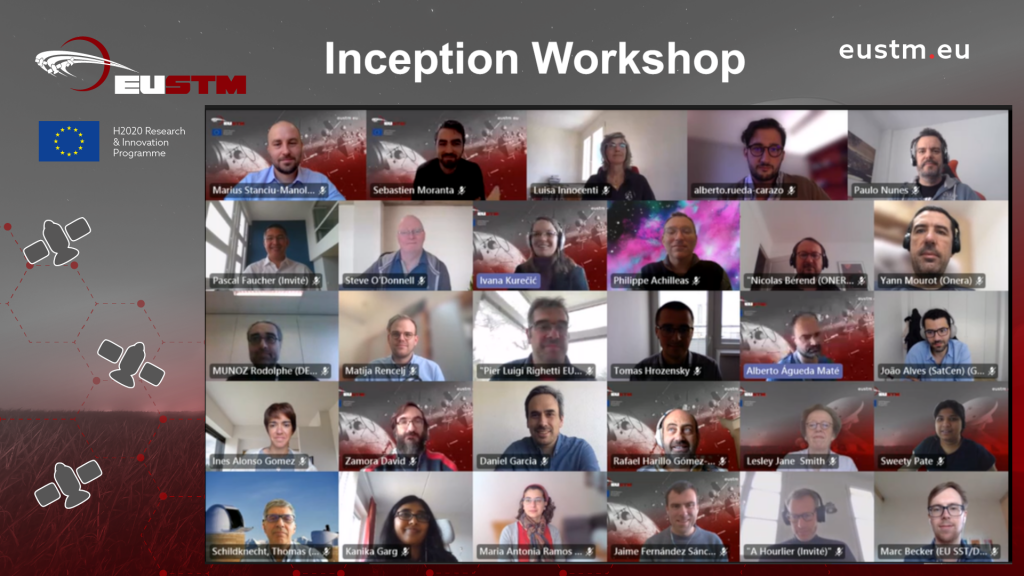Inception Workshop — Space traffic management goals of the EUSTM project
The goals and priorities of the Horizon 2020 project Space Traffic Management for XXI Century Space Operations — EUSTM were confirmed at the Inception Workshop that took place on 24–25 March 2021. The EUSTM project is a comprehensive project addressing European space traffic management in all its aspects, from its strategic, security, regulatory and policy framework, to the needed technological capabilities and the associated market opportunities and response. The goals agreed upon at the Inception Workshop will serve as the starting point to the intense work of the EUSTM consortium, which strives to deliver the definition of the future independent European capability in space traffic management.
By the end of August 2022, EUSTM aims to address all facets needed to design a European space traffic management capacity, including evaluation of existing scientific and technological space traffic management capabilities, strategic, security, policy and legal aspects, best practices and guidelines, as well as current and future space traffic management needs in the fast-developing NewSpace environment. The Inception Workshop discussions and contributions of the EUSTM consortium and the invited members of our Advisory Board led to lively discussions and the specification of the primary EUSTM foci in the first stage of the project:
- a detailed analysis of space traffic management approaches and best practices and
- space traffic management state-of-the-art and future needs.

Inception Workshop Conclusions
When it comes to the full definition of space traffic management, the EUSTM consortium unanimously agreed that, other than addressing all orbital regimes, it is far from trivial — but it can be grouped into STM objectives, scope and activities. What is clear is that the critical roles of national, European and international actors will have to be examined in detail.
On topics of policy and regulation, the EUSTM consortium believes that space traffic management must be an effort of international cooperation to both safeguard the space environment and ensure the proper development and innovation of the space sector. The international actor that first gets into the lead in STM will have a strong potential to set the playing field and influence the development of global norms and standards, but the tragedy of the commons must be avoided at all costs, and its solution is always cooperation. In all scenarios, the European space traffic management capacity will have to be technically sound and able to exist and grow independently from non-European assets.
A corresponding substantial risk that must be addressed lies within the socioeconomic consequences of standardisation, where some stakeholders may be left behind and unable to catch up if their needs are not taken into account in the design of requirements and standards for space traffic management. The concept of space traffic management is broad and encompassed various activities and possibilities — innovation activities in all sectors must be considered when designing a needed regulatory framework. With the proliferation of satellite constellations that are coming into play, no space traffic management system can be developed without consensus across all sectors.
The most significant technical barriers confirmed at the Inception Workshop were the adequate estimation of collision risk and the propagation of covariance analyses, especially as they concern small objects, and human-in-the-loop systems are still subject to debate. More research will certainly have to be done to address these issues.
The immediate next steps taken within EUSTM will validate the understanding of space traffic management needs for all user categories — surveys and consultations will help the EUSTM Consortium understand how to best design a system that will work for everyone. The deep discussions and significant outcomes of the Inception Workshop will form the basis for the overarching activities of EUSTM in the months to come.
In addition to all these efforts, a primary goal of EUSTM is to further develop and fortify the European network of space traffic management experts and increase the awareness of space traffic management and related topics amongst wider audiences. Join us on Twitter and subscribe to our newsletter at the bottom of this page to receive updates on our work and become part of the European STM future.
To learn more about EUSTM, visit our About page, to find out more about our consortium, visit our Team page, and to get in touch and help us shape the sustainable future of the European space sector, contact us directly or subscribe to our newsletter below.
This article reflects the view of the author and not necessarily the views of the European Commission or of the European Health and Digital Executive Agency.